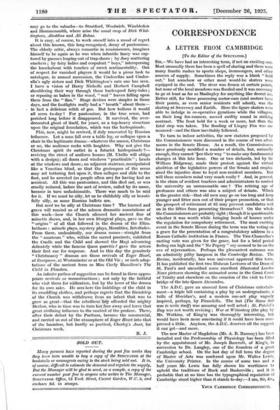CORRESPONDENCE
A LETTER FROM CAMBRIDGE
[To the Editor of the SPECTATOR.] SIR,—WC have had an interesting term, if not an exciting one. Most unusually there has been a spell of skating and there were many frantic rushes to sports shops, ironmongers, and other !sources of supply. Sometimes the reply was a blank " Sold out," but somehow or other most would-be skaters were equipped in the end. The river was frozen at certain points, but none of the local meadows was flooded and it was necessary to go at least as far as Madingley for anything like decent ice. Better still, for those possessing motor-cars (and motors have their points, as even senior residents will admit), was the skating at Swavesey and Earith. Here the figure skaters were able to indulge in co-operative gyrations while the villagers, on their long fen-runners, moved swiftly round in striking contrast. The frost held for a week or more, but then the fatal step was taken. The flooding of Lingay Fen was an- nounced—and the thaw inevitably followed.
To turn to indoor activities, the new statutes proposed by the Commissioners were discussed in the course of two after- noons in the Senate House. As a result, the Commissioners have graciously modified a number of details, but, naturally enough, they cannot "Isee their way " to make any fundamental changes at this late hour. One or two diehards, led by Sir
William Ridgeway, made their protest against the virtual abolition of the legislative powers of the -Senate and empha-
sized the injustice done to loyal non-resident members. But will these members mind very much really ? And, in general, is the claim of resident teachers and administrators to control the university an unreasonable one ? The retiring age of professors and others was also a subject of debate. Which is the greater risk—that old men may go on too long and keep younger and fitter men out of their proper promotion, or that the prospect of retirement at 65 may prevent candidates well on hi the fifties from presenting themselves ? On the whole the Commissioners are probably right ; though it is questionable
whether it was worth while bringing heads, of houses under the regulation for compulsory retirement. The most exciting
event in the Senate House during the term was the voting on a grace for the presentation of a congratulatory address to a Roman Catholic institution in France. The Vice-Chancellor's casting vote was given for the grace, but for a brief period
feeling ran high and the " No Popery "cry. seemed to be on the _ eve of rejuvenation. Perhaps the pleasantest outcome was an admirably pithy lampoon in the Cambridge Review. The Review, incidentally, has won universal approval this term.
It has published the first two Hulsean Lectures of the Dean of St. Paul's and unearthed some excellent illustrated London News pictures showing the animated scene in the Great Court
• of Trinity and elsewhere on the occasion of the visit to Cam- ' bridge of the late Queen Alexandra.
The A.D.C. gave an unusual form of Christmas entertain- ment—a triple bill containing a play by an undergraduate, a trifle of Sheridan's, and a modern one-act play vaguely
inspired, perhaps, by. Pirandello. The last (The Scene that was to write itself) was amusing and well acted ; St. Patrick's Day was not worth reviving ; War at Wittenberg (the play by Mr. Watkins, of King's) was thoroughly interesting, but would have been more convincing if it could have been com- pressed a little. Anyhow, the A.D.C. deserves all the support it can get—and more. - The new Master of Magdalene (Mr. A. B. Ramsay) has been installed and the Professorship of Physiology has been filled
by the appointment of Mr. Joseph Barcroft, of King's, in succession to Dr. Langley, one of the founders of a great Cambridge school. On the last day of full term the degree
of Master of Arts was conferred upon Mr. Walter Lewis, the University Printer. In the course of some two and a half years Mr. Lewis has fully shown his worthiness to uphold the traditions of Buck and Baskerville ; and it is probable that at no time has the typographical reputation of Cambridge stood higher than it stands to-day.—I am, Sir, cte.,
YOUR CAMBRIDGE CORRESPONDENT.






































 Previous page
Previous page